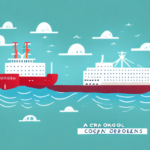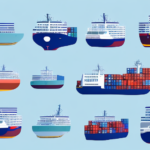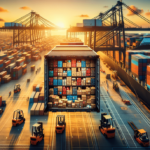Shipping with UPS Worldwide Express Freight LCL
If you're looking to ship your freight overseas, UPS Worldwide Express Freight LCL could be an ideal choice for you. This service is designed to suit the needs of businesses of all sizes that require flexible, secure, and reliable international shipping options. In this article, we'll explore the many features and benefits of shipping with UPS Worldwide Express Freight LCL and explain how you can prepare, track, and protect your shipments.
Understanding UPS Worldwide Express Freight LCL
UPS Worldwide Express Freight LCL is a less than container load (LCL) shipping service that offers businesses a cost-effective option for transporting their goods overseas. With this service, your freight is consolidated with other shippers' cargo into a single container, allowing you to share the container's cost with other shippers. This means you only pay for the space your cargo occupies in the container, rather than the entire container itself.
One of the benefits of UPS Worldwide Express Freight LCL is that it allows businesses to ship smaller quantities of goods without having to wait until they have enough to fill an entire container. This is particularly useful for businesses that have smaller orders or need to send goods to multiple destinations.
Additionally, UPS Worldwide Express Freight LCL offers reliable and fast transit times. Leveraging UPS's extensive global network, which includes air, ocean, and ground transportation options, your goods can reach their destination quickly and efficiently, helping you meet your customers' needs and expectations. According to [UPS Global Freight Forwarding](https://www.ups.com/global/en/services/freight.page), UPS handles millions of shipments annually, ensuring a robust and dependable service.
What is LCL Shipping and How Does It Work?
LCL shipping is a mode of transportation where multiple shippers consolidate their cargo in a single container. This differs from full container load (FCL) shipping, where a single shipper occupies an entire container. The LCL shipping method is ideal for businesses that cannot fill an entire container with their cargo or do not have the budget to do so. By sharing the container with other shippers, LCL shipping becomes a more affordable option.
When using UPS Worldwide Express Freight LCL, your cargo will be consolidated with other shippers' goods at a UPS facility. Once the container is full, it is transported to the destination port and then deconsolidated. The shipments are then segregated at the port based on the consignee and delivered to their respective destinations.
One key advantage of LCL shipping is the ability to ship smaller quantities of goods more frequently, rather than waiting to accumulate enough cargo to fill an entire container. This helps businesses maintain a steady inventory flow and better meet customer demand. Moreover, LCL shipping can be more environmentally friendly by reducing the number of partially filled containers, thereby lowering carbon emissions.
The Benefits of Using UPS Worldwide Express Freight LCL
- Cost Savings: Share the cost of the container with other shippers, making it significantly more affordable than FCL shipping.
- Flexibility: Suitable for businesses of all sizes, allowing shipments of varying quantities and the addition of special services like customs clearance and insurance.
- Reliable Transit Times: Utilize UPS's global network to ensure timely and efficient delivery of your shipments.
- Excellent Tracking and Visibility: Monitor your shipment at every stage with UPS's comprehensive tracking system, enhancing supply chain management.
- Trusted Service: UPS's century-long reputation in the logistics industry ensures your shipments are handled with care and delivered on time.
How to Prepare Your Shipment for LCL Shipping with UPS
To ensure your cargo is secure and ready for shipment, follow these preparation steps:
- Proper Packaging and Labeling: Ensure that your cargo is packed securely and labeled clearly to prevent damage and facilitate easy identification at the destination.
- Detailed Packaging Information: Provide accurate details such as weight, dimensions, material, and the number of pieces to determine the shipping rate correctly.
- Complete Shipping Documents: Prepare all necessary documents, including the packing list, commercial invoice, and bill of lading, to avoid delays during transit.
- Special Handling Instructions: If your cargo is fragile, hazardous, or requires special handling, inform UPS to take the necessary precautions.
- Compliance with Regulations: Ensure that your shipment complies with all relevant regulations and that you have obtained the necessary permits and certifications.
Tips for Choosing the Right Packaging for Your LCL Shipment
The right packaging is crucial for the safety of your shipment during transportation. Consider the following tips when selecting packaging:
- Durability: Use strong and durable packaging materials to protect your cargo from moisture, temperature changes, and shocks.
- Cushioning: Add cushioning materials like bubble wrap to further safeguard your goods.
- Clear Labeling: Ensure all packages are labeled clearly and accurately to avoid confusion and facilitate easy identification.
- Regulatory Compliance: Adhere to the packaging regulations of the destination country to prevent delays or rejection of your shipment.
- Eco-Friendly Materials: Opt for biodegradable or recyclable packaging to reduce your environmental footprint and appeal to eco-conscious customers.
Understanding the Cost Structure of UPS Worldwide Express Freight LCL
The cost of UPS Worldwide Express Freight LCL depends on several factors, including the weight and volume of your shipment, the origin, and the destination. To obtain an accurate estimate, you can use the UPS rate calculator, which provides the total cost of shipping your container.
The calculator also offers additional details such as transit time and surcharges, helping you determine if this shipping option aligns with your budget and timeline. For a more personalized quote, you can contact a UPS representative to discuss your specific requirements.
Common Challenges in LCL Shipping and How to Overcome Them
While LCL shipping offers numerous benefits, it also comes with certain challenges:
- Potential for Cargo Damage: Mitigate this risk by using appropriate packaging, properly labeling your cargo, and securing it adequately.
- Slow Transit Times: Delays often occur during customs clearance. To prevent this, ensure all your documents are accurate and complete. Utilizing UPS's customs clearance services can also expedite the process.
Tracking Your Shipment with UPS Worldwide Express Freight LCL
With UPS Worldwide Express Freight LCL, you can easily track your shipment from start to finish. Use your tracking number to access real-time information about your cargo's location. This feature is especially beneficial for time-sensitive shipments, providing peace of mind and enhancing supply chain transparency.
How to File a Claim for Damaged or Lost Shipments with UPS
If your shipment is lost or damaged during transportation, you can file a claim with UPS. Here's how:
- Document the Damage or Loss: Take clear photos and gather any relevant documents that evidence the issue.
- Submit Your Claim: Visit the UPS claims page to submit your documentation.
- Follow Up: A UPS representative will review your claim and provide further instructions on the next steps.
Ensuring you have proper insurance coverage can also streamline the claims process and provide financial protection against unforeseen incidents.
The Difference Between FCL and LCL Shipping
When shipping cargo overseas, you have two primary options: FCL and LCL shipping.
- FCL (Full Container Load): You rent an entire container for your shipment, which is ideal for large shipments. However, it is generally more expensive as you pay for the entire container regardless of usage.
- LCL (Less Than Container Load): Your shipment shares a container with other shippers, making it a more cost-effective option for smaller loads.
Choosing between FCL and LCL depends on your shipment size, budget, and delivery timeline. For detailed comparisons, refer to [Freightos](https://www.freightos.com/freight-resources/fcl-vs-lcl/).
Why Choose UPS Worldwide Express Freight LCL Over Other Shipping Options
UPS Worldwide Express Freight LCL stands out among other shipping options due to its combination of cost-effectiveness, reliability, and comprehensive services. Here are the key reasons to choose this service:
- Affordability: Sharing container costs with other shippers reduces overall expenses.
- Speed and Reliability: Benefit from UPS's global logistics network to ensure timely delivery.
- Comprehensive Services: Access additional services such as customs clearance, insurance, and detailed tracking.
- Trusted Partner: Leverage UPS's extensive experience and reputation in the logistics industry.
Understanding Customs Clearance in LCL Shipping with UPS
Customs clearance is a critical component of LCL shipping, ensuring that your cargo adheres to international trade regulations. To facilitate a smooth customs process, follow these guidelines:
- Accurate Documentation: Provide all necessary documents, including commercial invoices and packing lists, accurately and completely.
- Awareness of Regulations: Understand the import duties, taxes, and customs fees applicable to your shipment in the destination country.
- Compliance: Ensure that your goods comply with all relevant regulations, including restrictions on certain items.
For more information on customs regulations, refer to the [World Customs Organization](https://www.wcoomd.org).
The Role of Insurance in Protecting Your LCL Shipment
Insurance is essential for protecting your LCL shipment during transportation. With UPS Worldwide Express Freight LCL, you can purchase insurance to cover your cargo against potential damage or loss. Here’s what you need to do:
- Assess Your Cargo's Value: Determine the total value of your goods to ensure adequate coverage.
- Purchase Appropriate Insurance: Select an insurance plan that covers the full value of your shipment, providing financial protection in case of incidents.
By securing insurance, you safeguard your investment and ensure that any unforeseen circumstances do not result in significant financial losses.
Overall, UPS Worldwide Express Freight LCL is an excellent option for businesses looking to ship their cargo overseas in a cost-effective and efficient manner. With numerous features and benefits, along with user-friendly tracking and insurance options, businesses can trust that their shipments will reach their destinations safely and on time.






















